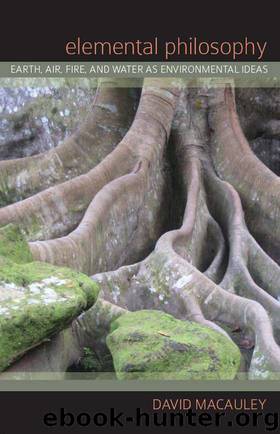Elemental Philosophy: Earth, Air, Fire, and Water as Environmental Ideas (SUNY series in Environmental Philosophy and Ethics) by Macauley David

Author:Macauley, David [Macauley, David]
Language: eng
Format: epub
Publisher: State University of New York Press
Published: 2010-09-28T16:00:00+00:00
A Dictionary of Elemental Definitions
In the first-known philosophical lexicon in Western history, Book Delta of the Metaphysics , Aristotle sets forth several definitions of stoicheion (element), providing us with a starting point for our investigation and a set of rungs to help assemble the scaffold of his theory or theories. Aristotle is methodologically more systematic than his predecessors in treating the elements, and this fact is evident in his attempts to define the stoicheia . For the most part, Aristotle's use of the term is stripped of metaphorical dimensions that were present in the earliest Greek usage. He identifies “element” first as “the primary component immanent in a thing, and indivisible in kind into other kinds” (1014 a26–27). We should note here the notions of (a) primary (b) immanence (c) indivisibility, and (d) kind (as opposed to quantity) that are brought out in this definition. In one sense, elements are, quite simply, those things that are fundamental, most basic, or elementary. For example, the elements of speech are the parts into which it can be divided ultimately such that these parts are no longer divisible into other speech that is different in kind. In illustrating this definition, Aristotle draws implicitly on two meanings of stoicheia (evident in Plato) when he resorts to a comparison via simile of the elements understood as components of speech (i.e., letters) with the elements construed in a material sense. Although this analogy holds, we should not consider the elements of physical things such as bodies to be linguistic elements. In this regard, we must speak of elements of something, not elements in themselves—that is, elements simpliciter .
Aristotle offers in the same work a second definition of stoicheion that stresses (e) smallness (f) simplicity, and (g) universality as belonging to the notion. This meaning is spoken of in terms of a transference and application of the initial definition such that it becomes useful for multiple purposes. The implication is that this understanding is more popular and common, as well as the source of the idea that the elements are the most universal of things because each is singular and simple, present in a plenitude of things. Such unity, Aristotle suggests, is what some earlier philosophers considered to be first principles. In any event, the idea of an immanent first component is part and parcel to all these meanings of element .
Aristotle also characterizes the elements as primary constituents of bodies in De Caelo (Peri Ouranous in Greek). An element is “a body into which other bodies may be analyzed (diaipeitai ), present in them potentially or actually… and not itself divisible (adiaipeton ) into bodies different in form (to eidei )” (302a16–18). This definition is significant because it calls attention to the fact that elements are simple bodies—as they are for Plato—and it reiterates their indivisibility. Aristotle concludes that such bodies must exist because, for example, fire and earth are potentially present in bodies such as wood and flesh given that they are seemingly exuded from them.
Download
This site does not store any files on its server. We only index and link to content provided by other sites. Please contact the content providers to delete copyright contents if any and email us, we'll remove relevant links or contents immediately.
The remains of the day by Kazuo Ishiguro(9002)
Tools of Titans by Timothy Ferriss(8402)
Giovanni's Room by James Baldwin(7351)
The Black Swan by Nassim Nicholas Taleb(7136)
Inner Engineering: A Yogi's Guide to Joy by Sadhguru(6798)
The Way of Zen by Alan W. Watts(6619)
The Power of Now: A Guide to Spiritual Enlightenment by Eckhart Tolle(5788)
Asking the Right Questions: A Guide to Critical Thinking by M. Neil Browne & Stuart M. Keeley(5778)
The Six Wives Of Henry VIII (WOMEN IN HISTORY) by Fraser Antonia(5518)
Astrophysics for People in a Hurry by Neil DeGrasse Tyson(5193)
Housekeeping by Marilynne Robinson(4453)
12 Rules for Life by Jordan B. Peterson(4308)
Ikigai by Héctor García & Francesc Miralles(4277)
Double Down (Diary of a Wimpy Kid Book 11) by Jeff Kinney(4275)
The Ethical Slut by Janet W. Hardy(4261)
Skin in the Game by Nassim Nicholas Taleb(4255)
The Art of Happiness by The Dalai Lama(4132)
Skin in the Game: Hidden Asymmetries in Daily Life by Nassim Nicholas Taleb(4010)
Walking by Henry David Thoreau(3966)
